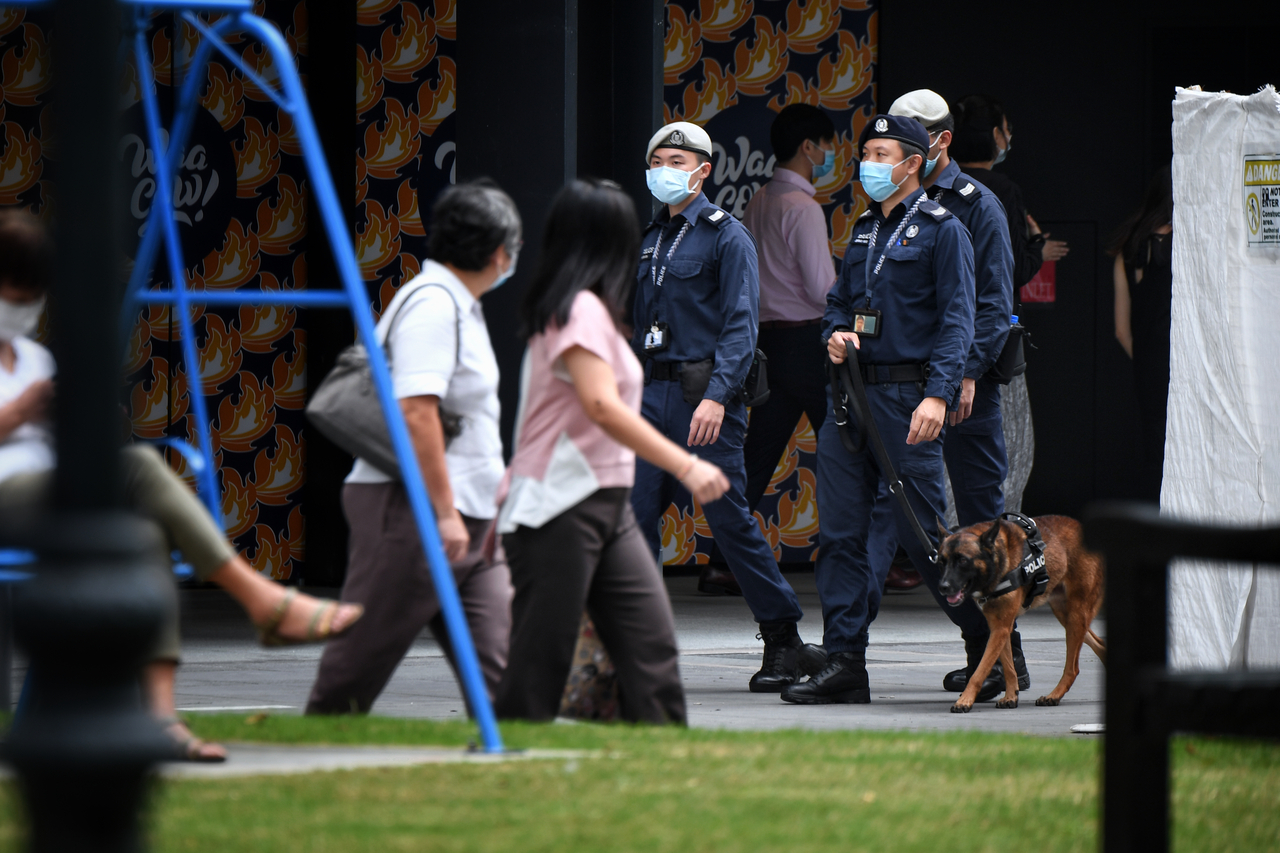37 people investigated, 16 foreigners deported in wake of recent terror attacks abroad: MHA
Sign up now: Get ST's newsletters delivered to your inbox

The Home Team has been on heightened security alert since early September, and stepped up security measures to pre-empt copycat attacks in Singapore.
PHOTO: ST FILE
Follow topic:
SINGAPORE - The authorities have investigated 37 people and deported 16 foreigners as part of intensified security efforts in the wake of terror attacks in France and elsewhere.
A radicalised 26-year-old Bangladeshi construction worker was also detained under the Internal Security Act on Nov 2 for terror-related activities, the Ministry of Home Affairs (MHA) announced on Tuesday (Nov 24).
The 14 Singaporeans and 23 foreigners investigated had attracted the authorities' attention for suspected radical inclinations, or for making comments which incite violence or stoke communal unrest.
In particular, the majority had supported the beheading of French teacher Samuel Paty and the subsequent attacks in France and elsewhere, among other things, said the MHA.
They had also incited violence against France or French President Emmanuel Macron in retaliation for the French government's defence of the Charlie Hebdo cartoons. A few had made derogatory remarks against Muslims, said the MHA.
The 16 foreigners - 15 Bangladeshis and one Malaysian - were repatriated after the Internal Security Department completed investigations on them.
The Malaysian was found to be radicalised and intended to travel to Syria or Palestine to partake in armed violence.
Most of the 15 Bangladeshis were working in the construction industry. The MHA said they had, in response to the recent terror attacks in France, made social media posts which incited violence or stoked communal unrest.
"Investigations into the remaining seven foreigners are still ongoing," said the ministry.
It added that while a handful of those investigated had commented on the same discussion threads on social media, the majority of cases are not connected to each other.
"To date, there is no indication that any of the these individuals had been planning any attacks or protests in Singapore," said the MHA.
Meanwhile, investigations are ongoing into the 14 Singaporeans - 10 men and four women aged between 19 and 62 years old.
Speaking at a Religious Rehabilitation Group seminar on Tuesday (Nov 24), Minister for Home Affairs and Law K. Shanmugam said that while both Singapore and France are secular, with both guaranteeing freedom of religion, the approaches taken are different.
"France says they prefer to achieve it by taking a hands-off approach, we are interventionist. We intervene. Because we take the position that the right to speak freely goes with the duty to act responsibly. The two must go together.
"As a secular Government, we are neutral in treatment of all religions. But we also do not allow any religious group to be attacked or insulted by anybody else, whether majority or minority - same rules," he told the audience at the Khadijah Mosque in Geylang.
Singapore also guarantees the freedom of religion - the right of anyone to practice their religious beliefs, and the country protects everyone from any threats, hate speech, or violence, he said.
"That is the assurance one gets in Singapore. It's also what we need to do to preserve racial and religious harmony in Singapore.
"And therefore the Charlie Hebdo-type of cartoons will not be allowed in Singapore, whether it's about Catholicism, Protestants, or Islam or Hindus," added the minister.
An 18-year-old Muslim-Russian refugee had killed Mr Paty, 47, in a Paris suburb last month, after the teacher showed his teenage students a caricature depicting Prophet Muhammad from satirical magazine Charlie Hebdo during a lesson on free speech.
Charlie Hebdo had re-published the caricatures - considered by many Muslims to be blasphemous - on Sept 1, five years after its offices were targeted in a high-profile attack by gunmen which killed 12 and injured 11 others.
The MHA noted the spate of terrorist attacks in France since the re-publication, including the beheading of Mr Paty.
There have also been attacks elsewhere, such as in Jeddah in Saudi Arabia and Vienna in Austria, signalling a heightened threat against French or Western interests outside of France.
"In addition, a palpable anti-French climate has developed in several countries, as seen in large protests and calls for boycotts, as well as an uptick in terrorist rhetoric online," said the MHA.
In view of this deteriorating security situation, the Home Team has been on heightened security alert since early September, and stepped up security measures to pre-empt copycat attacks in Singapore.
The police and the Immigration and Checkpoints Authority have beefed up their security measures and patrols, it said.
While the detained Bangladeshi, Ahmed Faysal, is not linked to the incidents in France, the ISD's preliminary investigations found he was radicalised and harboured the intention to undertake armed violence in support of his religion, said the MHA.
He wanted to travel to Syria to fight alongside the Islamic State in Iraq and Syria (ISIS) and another militant group, and bought foldable knives in Singapore which he claimed he would use for attacks in Bangladesh. He had also watched firearms-related videos online.
There is no indication thus far that Faysal intended to carry out acts of violence in Singapore, the MHA said.

Asked by reporters if recent investigations had uncovered any threats to Singapore, Mr Shanmugam made the point that Faysal was collecting weapons, planning attacks in Bangladesh, and encouraging radicalism.
"You work it out for yourself; if he finds he can't go back to Bangladesh immediately, could he have decided one day to just attack people in Singapore?
"It's a very easy switch. His propaganda, his call for others to attack people of other faiths, that could have influenced other people too," he said, adding that this was why Faysal was detained.

